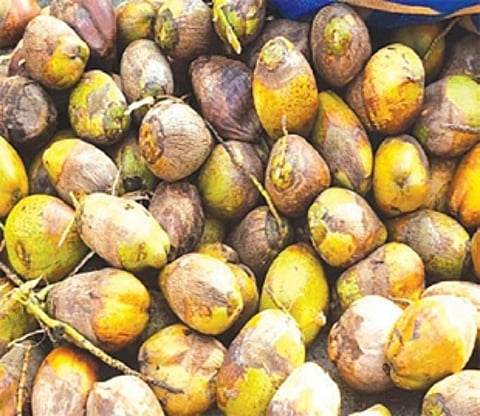

MARGAO: Compared to the previous years, the decrease in coconut yield this year has left the farmers from South Goa worried about their future. Be it a coconut plantation owner in Velsao or a wholesale trader in Benaulim, the consensus amongst the stakeholders is that there has been a drop in yield as they feel they are still managing with the present scenario.
However, they are worried about what the future may hold in this crucial agricultural sector that has been a time-tested source of income.
Roy Fernandes, a farmer from Maina-Curtorim said, “Urgent action is needed. The situation demands immediate and comprehensive action."
Roy said, "Addressing climate change mitigation strategies, tackling new diseases, and supporting efficient processing models are critical. Additionally, exploring untapped markets like branded toddy products and streamlining government assistance are crucial steps towards ensuring the future of Goa's coconut industry,”
Speaking to various plantation owners across the district, they attributed shifting weather patterns fuelled by climate change as a major cause contributing to the decline in the yield.
They spoke about how rising temperatures and humidity create a breeding ground for mites, which spread diseases that diminish the coconut quality and size, and how this vicious cycle further amplifies the mite problem, leaving trees weakened and less productive.
Some of them also referred to an unusual phenomenon that has added another layer of complexity. They believed that as paddy harvests conclude, worms migrate to coconut trees, seeking a new source of sustenance, further damaging leaves and hindering the trees’ ability to thrive.
“Droughts in some areas exacerbate the situation, while the ongoing conversion of land for development, often accompanied by deforestation, disrupts the ecosystem vital for coconut health. This loss of crucial vegetation further reduces yields,” said Jack Mascarenhas, President of Goyche Fudle Pilge Khatir (GFPK), which had numerous meetings across the district with farmers to help them send feedback for the draft agriculture policy.
A key point that plantation owners spoke about was changing economic realities. They felt that while they are grappling with increasing labour and other costs, coconut prices remain stagnant or even decline. This squeeze on profits has led many to neglect their groves, contributing to the overall decline in production.
For some of them, however, government assistance has been met with frustration as they find subsidies ineffective and bureaucratic, preferring simpler, direct purchase options, and adding that they prefer even paying the basic costs of services such as annual tree checkups, etc.
One such farmer from South Goa, with 800 trees, gave the example of the tragic loss of his crop after following government fertiliser recommendations, and his unsuccessful attempts to get this issue resolved further eroded his trust in the support system.
When asked about the way forward, the stakeholders stated that the community agri-processing units offer hope for small-scale farmers, allowing them to collectively process their coconuts and access wider markets.
“Unlike Kerala, which has successfully branded and marketed toddy products, Goa has failed to capitalise on this lucrative opportunity. Strategic marketing, such as incorporating toddy-based drinks into beachside establishments, could significantly boost profitability,” Mascarenhas added.
Amancio Fernandes, former deputy director of agriculture, also listed various steps that need to be taken to address this sector from a holistic point of view.
Amancio proposes the establishment of a Coconut Development Board Unit in Goa with the mandate to promote coconut-related programmes across India. “Such a dedicated unit can effectively oversee plantation development and ensure suitable returns for farmers,” he added.
Amancio suggests establishing community processing units in clusters of coconut villages. “These units could produce value-added products like virgin coconut oil, fibre, coir compost, coco leaf mats, and traditional decor items. This approach would empower communities and create additional income streams for farmers,” he added.
Amancio also recommended implementing insurance schemes for coconut pluckers and regulating plucking costs per tree, which he felt would ensure their safety and provide fair compensation for their work.
Finally, Amancio emphasised the importance of promoting the Toddy Tappers’ Association of Goa with incentives. This profession is essential for Goan culinary traditions, particularly for the production of the famous ‘Sannas’, amongst other local delights. He believes supporting toddy tappers is crucial for preserving this cultural heritage.